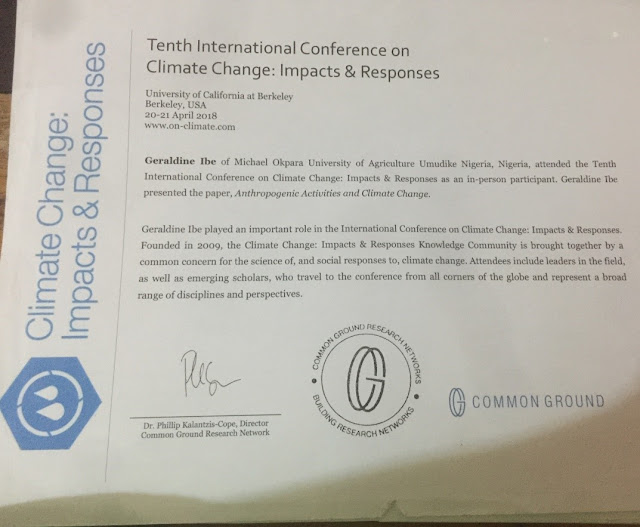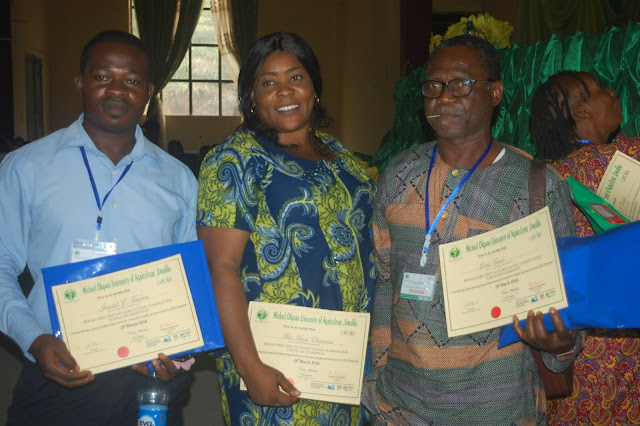By George Lakey, CIRCLE
Programme Officer
Last month, the Climate Impacts
Research Capacity Leadership Enhancement in Africa (CIRCLE) programme headed to
Ghana to bring together representatives from 20 higher education institutions
across sub-Saharan Africa to celebrate the success of the CIRCLE Institutional
Strengthening Programme (ISP) and discuss how to build on their achievements
for the remainder of the programme.
Bringing together institutional champions who participated in the
ISP, along with CIRCLE Visiting Fellowship alumni, the CIRCLE ISP Workshop
showcased how participating institutions are improving support for their early
careers researchers (ECRs) working in the field of climate change.
CIRCLE was designed to address the low percentage of African scientists contributing to global climate change publications via two components; the CIRCLE Visiting Fellowship Programme and the CIRCLE ISP. An independent review of CIRCLE, conducted in 2017, detailed the success of the programme. However, the review noted that more time would be required to enable the ISP component to become embedded within participating institutions. Therefore, while CIRCLE was initially planned to run from 2014-2018, a one-year extension was granted by the UK Department for International Development (DFID) to pursue this goal, and will now officially closed in March 2019.
It is within this context that the CIRCLE ISP Workshop 2018 was designed. Held in Accra, Ghana, from 17th-19th October 2018, the workshop had two principle aims:
- Further embed the CIRCLE ISP into the wider institutional context to ensure the sustainability of the impact of CIRCLE beyond March 2019.
- Provide training to participants for the CIRCLE ISP Case Study Visit activity which will ensure the sharing of experiences and learning across the CIRCLE network and beyond.
The ISP has been a remarkable
success, with many institutional improvements for support of ECRs. During the
workshop, the CIRCLE Team had the opportunity to present key findings from the
latest CIRCLE Programme Reporting Series, sharing news of the numerous
achievements reported since the programme began in 2015. At the start of
CIRCLE, 3 institutions had formal mechanisms in place to mentor ECRs
effectively, 5 institutions had policies and/or strategies for supporting
career and professional development planning and 17 institutions indicated that
the delivery of professional development opportunities for staff was
satisfactory or poor. This month, we were proud to report that 20 institutions
now have formal mentoring mechanisms to mentor ECRs effectively, 14
institutions have indicated that they currently have policies and/or strategies
formally in place for supporting career and professional development planning
for research staff at their institution, and an additional 4 institutions
reported having draft policies awaiting approval. 24 institutions reported an
increase in the quality and quantity of training and support offered to ECRs
compared with the start of the programme. It really is extraordinary that so
many improvements have been put into place by our ISP Champions, and that these
have reached beyond the Departments involved in our programme.
Throughout the workshop, we heard from individual Champions who had made such achievements, sharing their thoughts on how they had been successful. We heard from Prof. Philippa Ojimelukwe of Michael Okpara University of Agriculture, Umudike, on her experience of developing a formal mentoring programme at her institution, while Prof. Maria Tsvere from Chinhoyi University of Technology spoke about how she created a sustainable ISP Action Plan for her institution that has facilitated improvements in support beyond her academic department.
Our ISP partner, Vitae, also provided tailored support and advice for participants over the course of the workshop on how to build upon the work carried out so far and how to achieve wider institutional recognition and embedding of ISP learning. While CIRCLE is of course encouraging institutions to think about how they can maximise the impact of the ISP between now and the end of the programme, we are also encouraging our Champions to think beyond CIRCLE. Our programme has created a network of climate change researchers and departmental staff who have worked together to address support needs for ECRs in order to boost the input that African academics have on climate change research.
We want to ensure that this network is maintained long after our programme draws to a close. To help achieve this, CIRCLE is also funding a series of case study visits, whereby each institution involved in the ISP nominates a representative to visit another institution in the network to share knowledge and best practise in the delivery of their ISP. The nominated representative will visit their matched institution to learn from their successes and challenges and share the experiences from their home institution. The visits are a fantastic opportunity for our institutions to share their learning and experiences across the CIRCLE network. The reports from these visits will also provide contextual successes and challenges from African institutions to feed into a series of CIRCLE Good Practice Guides, developed in partnership with Vitae. The Guides are designed to be used by any institution to help them design and develop their very own ISP. This will ensure that the innovative and comprehensive approaches to building support for early careers researchers developed by institutions involved in CIRCLE can be shared and expanded by any institution outside the network.
The Next 6 Months
Following on from the workshop, ISP Teams will be submitting applications to the CIRCLE ISP Implementation Fund and carrying out their activities to further embed the ISP at their institution. The CIRCLE ISP Case Study Visits will occur in November 2018, with reports being submitted in December. The CIRCLE Team will be carrying out surveys of CIRCLE and non-CIRCLE affiliated individuals and institutions to collect data for the next CIRCLE Programme Reporting Series. Read the latest reports here.
Thank yous
I have been the CIRCLE Programme
Officer at ACU since August 2018. This is the first discrete international
project I have had the honour to work on, and the first workshop I have had the
pleasure to help organise. The logistical challenges of organising the travel,
accommodation, and subsistence for over 40 participants from 9 different
countries notwithstanding, the experience I have gained in the lead up to the
workshop has been invaluable, and the opportunity to meet such amazing people
in such a great location was unforgettable.
On behalf of the
ACU, CIRCLE, and all the delegates, I would like to extend my thanks to all the
staff at the Best Western Plus Accra Beach Hotel for their incredible
hospitality and support.
We would also
like to thank Vitae for their important contribution to the development of the
workshop programme and the successful delivery of their sessions, and Prof.
John Morton for his contribution and creation of the CIRCLE Organisational Strategies and
Structures for Climate Change Research in Sub-Saharan Africa Report.
But most importantly,
thank you to all the delegates who participated in the CIRCLE ISP Champions
Workshop 2018 and worked tirelessly to make it an unequivocal success.


















































